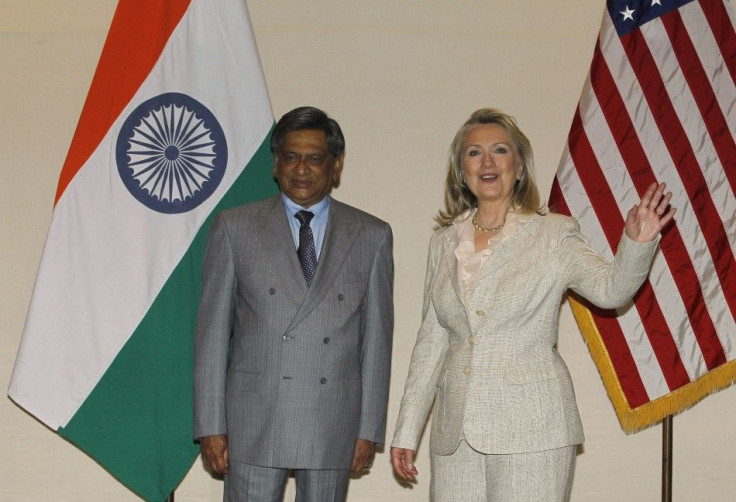Clinton Urges Pakistan To Fight Terrorism, Asks India To Cut Iranian Oil Imports

U.S. Secretary of State Hillary Clinton has warned Pakistan that it must do a better job of fighting terrorists operating within its borders, according to the Press Trust of India.
Speaking in New Delhi at a joint news conference with India’s External Affairs Minister S.M. Krishna, Clinton said Islamabad must ensure that its territory is not used as a “launching pad” by militants for attacks both within and outside the country.
“Combating violent extremism is something we all agree on. ... Pakistan should do more in ensuring that terrorists don’t use … launching pads … to attack the country and outside. The unfortunate thing is the attacks have taken the lives of 30,000 Pakistanis,” she said.
“We need stronger, more concerted efforts against the scourge of terrorism.
Clinton and Krishna also urged Pakistan to bring all the perpetrators of the 2008 Mumbai terrorist attacks to justice, including Hafiz Sayeed, the chief of Jama'at-ud-Da'wah [JuD], an organization widely believed to be a front for the Lashkar-e-Taiba (LeT) terrorist group.
About 165 people were killed in Mumbai in late 2008 in that attack. India has long accused Pakistan of harboring some of the culprits.
Last month, the U.S. government placed a $10 million bounty on Saeed’s head, for his alleged role in the Mumbai attacks. Saeed has denied the charge and lives openly in Pakistan.
“We have issued this reward [on Saeed],” Clinton told reporters. “We had earlier been successful. This is not unique. This is not a special case.”
She added that she hoped the JuD head is eventually arrested and convicted.
The two senior government officials also discussed security in Afghanistan, Iran’s nuclear ambitions as well as India’s dependence on Iranian oil imports during their talks.
“The best way to achieve this diplomatic tool [against Iran], that we all seek … is for the international community to stay united and to keep the pressure that has brought Iran back to the negotiating table,” she said.
Clinton added that next week her government will dispatch an energy envoy to India to discus alternative sources of energy for India as a substitute for Iranian oil.
“India and the U.S. are after the same goal,” she said.
We commend India for the steps it is taking to reduce imports [of oil] from Iran. We are working with India on alternative sources of supply.
Krishna responded that India is keenly tied to affairs in the Middle East and that Delhi is concerned about Iranian nuclear plans.
“There are ties of culture and religion. We have a strong intent for the peaceful and negotiated settlement of issues. Our stand on this has been clear and consistent,” he said.
“I conveyed [to Clinton] our vital stakes in peace and stability in the Persian Gulf and wider West Asian region, given the 6 million Indians who live there and the region’s importance to our economy.”
However, he asserted India’s dependence on Iran “given India's growing energy needs” -- consumption has been climbing by 10 million tons annually.
“Iran is an important source of oil for us. It reflects the decision that is made on commercial, financial and technical consideration,” he said.
Clinton is on a three-nation Asian tour which also included China and Bangladesh on her itinerary.
© Copyright IBTimes 2024. All rights reserved.





















